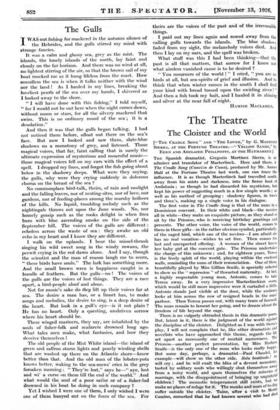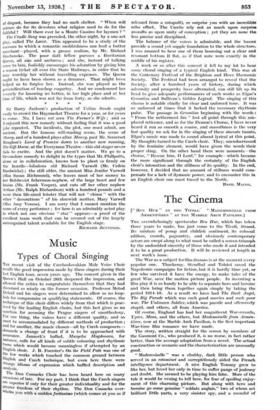The Theatre
. The Cloister and the World
[" THE CRADLE SONG" AND "THE LOVER," by G. MARTINET SIERRA, AT THE FORTUNE THEATRE.-" YELLOW SANDS,"ht
..
EDEN AND ADELAIDE PHILLPOTTS, AT THE HAYMARKET.]
THE Spanish dramatist, Gregorio Martinez Sierra, is ar admirer and translator of Maeterlinck. Here and there, ir. The Cradle Song (Caneion de Cana), produced by Mr. Anmel Hall at the Fortune Theatre last week, one can trace the influence. It is as though Maeterlinck had travelled south, away from his mists and darkness, into the fierce heat of Andalusia ; as though he had discarded his mysticism, but kept his power of suggesting much in a few simple words ; as well as his method of grouping : shadowy figures, in two's and three's, making up a single voice in his dialogue.
The first voice in The Cradle Song is that of the nuns in a Dominican convent. In their white and black—the novices all in white—they make an exquisite picture, as they stand or sit by the Prioress, who is receiving birthday greetings and presents. The other voice, the voice of the world, comes to them in these gifts—in the rather obvious symbol, particularly, of the caged bird, which one of the novices—I am afraid she has no real vocation—wishes to set free. Then comes the last and unexpected offering. A woman of the street leaves her baby girl at the convent gate. The Prioress undertakes the charge of this unknown ; and, for eighteen years, Teresa is the lively spirit of the world, playing within the enclosed walls, reminding the nuns of their renunciation. One of them, beautifully played by Miss Gillian Scaife, is specially selected to show us the repression of thwarted maternity. At last, a highly respectable young man, Antonio, comes to take Teresa away. In a very impressive Maeterlinckian scene, which would be still more impressive were it curtailed a little, Antonio stands just visible at the door, while the audience looks at him across the row of resigned heads in the nuns' parlour. Then Teresa passes out, with many tears of farewell. The nuns remain to lament her going, and to dream about the freedom of life beyond the cage.
There is no vulgarly obtruded, thesis in this dramatic poem. But, latent in it, there is the judgment of the world agaia4 the discipline of the cloister. Delighted as I was with Sierras play, I will not complain that he, like other dramatists and novelists who have approached this thethe, regards the hie set apart as necessarily one of morbid narrowness. The Prioress—another perfect presentation, by Miss Barbara Seaffe—is the only one of the nuns who looks really haPPY. But some day, perhaps, a dramatist—Paul Claude], for example—will show us the other side. Sola beatitudo! he will cry ; and he will exalt the bliss of a devout monotony, tasted by solitary souls who willingly shut themselves awe) from a noisy *mid, and spare themselves the .miseries uf, marriage, with the disappointment of bringing up ungrateful children 1 The monastic temperament still exists, but we make no places of refuge for it. The monks and nuns of to-day suffer outside the cloister. Taine, after a visit to Morrie Cassino, remarked that he had known several who had died of disgust, because they had- no such shelter. " When will science do for its devotees what religion used to do for the faithful ? Will there ever be a Monte Cassino for laymen " The Cradle Song was preceded, the other night, by a one-act play, called The Lover. This appeared to be a study of the excesses to which a romantic snobbishness can lead a butter merchant—played, with a greasy realism, by Mr. Michael Sherbrooke. The poor daft fellow pursues a Ruritanian Queen, all airs and archness ; and she, instead of talking sense to him, foolishly encourages his adoration by giving him a season ticket all over the State Railways, in order that he may worship her without travelling expenses. The Queen ought to have been shown as a dreamer. That might have helped us to forgive her. Instead, she was played as the personification of teashop coquetry. And we condemned her severely for knowing no better, in her high place and at her time of life, which was not far from forty, as she admits.
* *
Sir Barry Jackson's production -of Yellow Sands ought easily to crowd the Haymarket Theatre for a year, or for years to come. No, I have not seen The Farmer's Wife ; and so I enjoyed this new comedy without feeling that it was a good joke repeated. The incidents, the plot, one must admit, are ancient. But the famous will-reading scene, the scene of Money, and of a hundred plays after Money, past Mr. Somerset Maughan's Land of Promise down to another now running, The Gift Horse. at the Everyman Theatre—this old stager never fails to excite. And the plot doesn't matter. We go to a Devonshire comedy to delight in the types that Mr. Phillpotts, alone or in collaboration, knows how to plant so firmly on the boards—bibulous old Richard Varwell (Mr. Cedric Hardwicke) ; the still older, the ancient Miss Jenifer Varwell (Miss Susan Richmond), who leaves most of her money to her Bolshevist fisherman-nephew, of the large heart and few brains (Mr. Frank Vosper), and cuts off her other nephew Arthur (Mr. Ralph Richardson) with a hundred pounds and a more than life-sized lobster that will not " chime " with the other " decorations " of his shrewish mother, Mary Varwell (Miss Amy Veness). I am sorry that I cannot mention the name of every performer ; for here is an admirably acted play in which not one obvious " star " appears—a proof of the excellent team work that can be secured out of the largely unrecognized talent available for the English stage.
RICHARD JENNINGS.















































 Previous page
Previous page